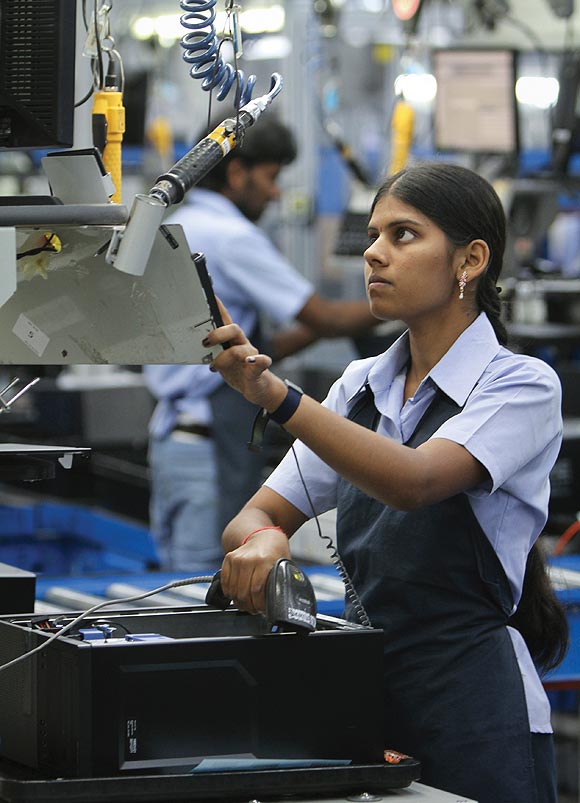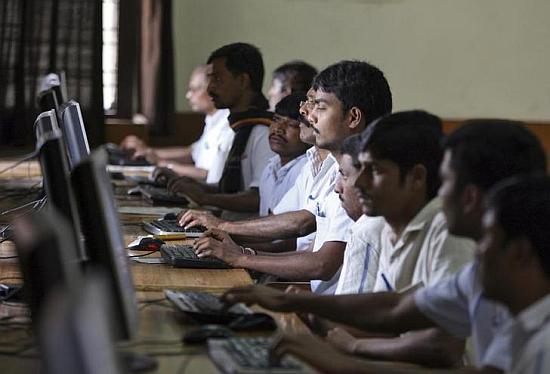 | « Back to article | Print this article |
3 reasons why India will need more interns by 2020
GP Chandra Kumar, co-founder, chairman and CEO of SkillSonics India Pvt Ltd, a vocational training organisation analyses the trends that'll influence the demand for Indian workforce in the world economy.
Apprenticeship is a proven method and has been practiced in India for over thousands of years now.
The Guru-Shishya way of passing on knowledge and skills was the only method used not only in spiritual know-how transfer but also in vocational areas.
India, being a very old civilisation has proven that knowledge and skill transfer did happen over many thousands of years and the way it is done has continually evolved over time.
Now is the time for India to focus on apprenticeship in the organised sector.
Here are a few reasons why India will need more interns by 2020..
Note: All images for representational purposes only
Please click NEXT to continue reading...
1. Huge projected demand in India and overseas
India hopes to double its labour force in the next ten years based on the growth projections of many sectors.
The Japanese workforce has been shrinking since 1995, and the Korean workforce will start to decline from 2015.
China's working-age ratio will peak in 2013 and then decline by a substantial amount in the next few decades.
Developed countries are already facing the issue of shortage in supply of labour.
In contrast, India’s age structure of the population is predicted to evolve favourably over the next two to three decades.
This demographic situation the country enjoys can be an advantage in a rapidly ageing world economy where we are in a position to become the skilled capital of the world.
However, if India doesn’t take steps to skill its youth, we are likely to be grappling with the huge challenge of unemployed youth and tremendous poverty.
2. Shift from unorganised to the organised sector
According to the eleventh Five Year Plan, less than 10 per cent of the Indian workforce has formal skill training in the form of technical education or vocational training.
In countries like Germany and Switzerland this percentage is around 70 per cent. It is important to skill our large workforce to raise employment as well as productivity.
Skills training is best done through apprenticeship and this has been proven in many countries worldwide.
The concerned industry needs to be actively involved in this training process to ensure that there is no demand-supply mismatch between training provided and training needed.
To increase the number of interns at a faster rate we have to look at the huge unorganised sector in India that has no formal training.
The unorganised sector comprises more than 90 per cent of our workforce.
We could look at models where good workers from this sector are recognised through relevant assessments/certifications to integrate them into the apprentice mainstream.
This will cater to the need for formal certification and create a new resource pool for hiring apprentices.
3. Companies will be globally competitive
Increased apprenticeship is also the need of the hour to sustain the growth of our economy.
Improvement in quality through introduction of global quality standards in apprenticeship training will also help in attracting and retaining the right talent.
We also need to promote the value of vocational training as a career to encourage more youth to becoming apprentices.
Students from all backgrounds (private schooling and government schooling) also need to be educated regarding the various options available to them after completing schooling and the possible career paths so they can make an informed choice on what they would like to pursue.
Companies in India can be globally competitive only if their entire work force is world class.
An apprentice/intern is broadly defined as someone who is working for and employer to learn a particular trade.
Today we need to act to increase the number of apprentices and also improve the quality of learning.
The learning has to be aligned to the market and to the individual’s capacity/talent.
This will help us in reaping the benefits of the demographic dividend and avoiding a possible situation of an unemployed population in the long run.
Increased apprenticeship opportunities will sustain economic growth and also provide a productive future to the workforce.



